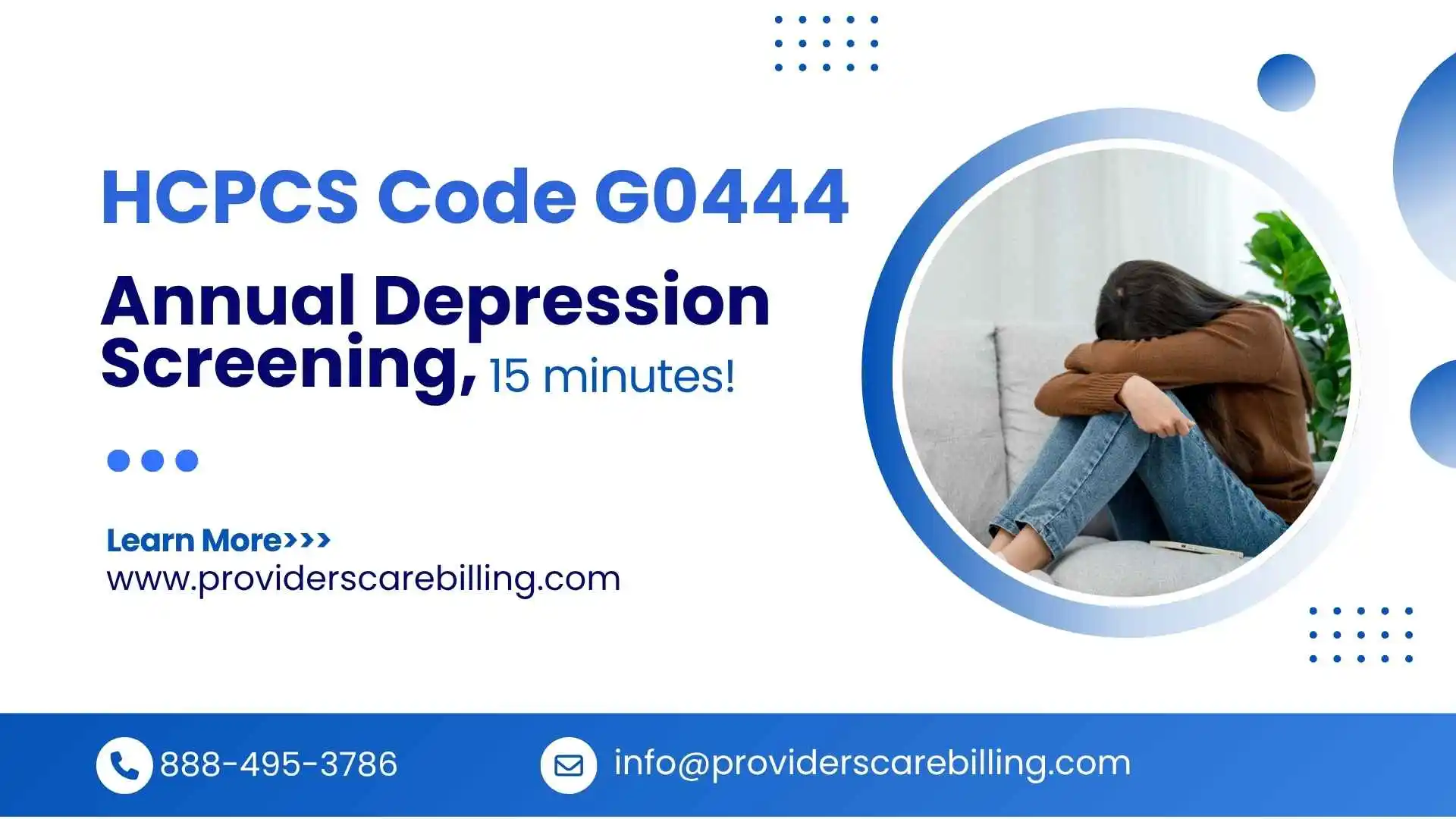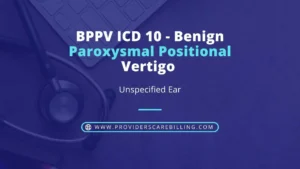Most people think that depression is just feeling sad or fatigued. But it is more than that because it can impact your emotions, thoughts, and even daily activities. Like most things, it is mostly overlooked in older adults. Either because they disregard it, or attribute it to normal aging, or other existing health complications.
This is why depression screening is an essential procedure, and especially for older adults on Medicare. The use of the g0444 CPT code helps healthcare practitioners offer annual, cost-free depression screenings to patients suffering from other chronic ailments. These screenings are rather simple, quick, and life-changing.
To know everything about g0444, read our blog posts thoroughly!
G0444 CPT Code Description
G0444 is a unique billing code for Part B of Medicare. It is referred to as an annual depression screening with a time allotment of 15 minutes using tools like the CPT PHQ‑9 or PHQ‑2. The patient does not pay anything out of pocket (no deductible, coinsurance, etc.). And the service itself must occur in a primary care facility, which includes a doctor’s office, outpatient clinic, or telehealth office (including the patient’s home).
Medicare Part B beneficiaries, who include most individuals over 65 years old, receive the screening once every 12 months. And yes, even without presenting symptoms of depression. However, screening is not allowed during emergency visits or inpatient settings; it must be during outpatient wellness care.
Why Depression Screening Matters for Older Adults
Depression screening CPT codes are important for older adults due to the following reasons;
High Prevalence in the Senior Population
A considerable number of elders suffer from depression. The presence of chronic illnesses in a person, such as heart disease, diabetes, or even cancer, increases the chances. However, depression is something that is often neglected. Because it is often bundled with other health complaints, which can include but are not limited to fatigue, sleep issues, and appetite loss.
Signs May Be Overlooked
Seniors may feel low, lose interest, or have memory problems from a cognitive perspective. Such symptoms might be viewed as a sign of aging or the effects of other diseases. This is the reason why using a standard screening tool enables doctors to recognize true depression more easily.
If a patient screens positive for depression and also shows signs of substance use, it may be appropriate to refer them for more comprehensive behavioral health treatment. In such cases, understanding how to bill for programs like CPT Code H0015 – Intensive Outpatient Alcohol and Drug Treatment Services becomes essential for proper reimbursement and continuity of care.
Early Detection Leads to Better Outcomes
As stated in the US Preventive Services Task Force, regular screening for depression should be conducted when adequate follow-up care and treatment plans are provided, and this is designated as Grade B. Research shows that it’s best to detect depression early on and provide follow-up care such as therapy, medication, or alteration in daily activities.
What g0444 Actually Covers and What It Doesn’t
Covered by Medicare
- An assessment for depression using the CPT code for PHQ-2 lasting under 15 minutes.
- No charge by the patient. Fully covered under Medicare Part B.
- Other staff, such as nurses or medical assistants, can be involved. The assistants can carry out the screening, score the results, and inform the doctor.
- Allowed once a year, there should be an interval of at least 11 months before the screening.
Not Covered
- Do not include treatment evaluation or process assessment, only the initial screening.
- Cannot be claimed during the initial ‘Welcome to Medicare’ visit or during the first Annual Wellness Visit, as they are standalone.
- If mild or severe depression exists, additional time or more services will need to be added and billed under different codes (E&M or behavioral health codes).
How the Screening Process Works
The complete process of using this ICD 10 code for screening of depression involves some main steps that are as follows;
Step 1: Conducting the Screening
During a general appointment, a staff member (nurse or aide) requests that the patient take the PHQ-2 or PHQ-9 survey. These instruments comprise straightforward questions regarding one’s mood, interest in various activities, and sleep, energy, or appetite levels. The majority of patients can finish these in under 15 minutes.
Step 2: Scoring and Sharing with the Doctor
Support staff score the answers and provide results in a timely manner. Any score within the range determined is considered healthy. An elevated score within a certain range indicates depression and flags the need for further evaluation.
Step 3: Follow-Up Actions if Needed
In the case where depression is suspected, the physician might:
- Discuss findings with the participant
- Request further assessments or evaluations
- Refer to appropriate mental health professionals
- Commence therapy or pharmacotherapy
Medicare defines a “follow-up plan” as part of quality care, a documented plan of referrals, interventions, or self-management strategy within a 0 – 2 day time frame, which is said to be a disorder and has specific strategies to manage it.
Step 4: Filing the Claim
The claim submission will include G0444 and Z13.89 (the ICD-10 code for the screening encounter) with no additional time documentation other than the screening being completed. Any evidence that screening was done “up to 15 minutes” is adequate.
Step 5: Repeat Yearly
To adhere to Medicare guidelines, the screening can only be claimed once every 12 months as the “reset” point, plus an 11-month interval leading up to it.
Benefits for Patients and Providers
For Patients
- Having absolutely no cost ensures there won’t be any surprise bills.
- Regular mental health screening is placed in the same category as physically checking your blood pressure.
- Depression that is hidden and goes unnoticed can often be screened. This program aids in detection during the early stages.
- Early treatment boosts mood, helps strengthen relationships, and improves one’s quality of life.
For Providers
- Medicare reimburses about $18 per screening, better than typical private insurance payments (~$15).
- Time scribed for documentation ensures easily verifiable preventive care.
- Sewing mental health into physical health improves quality of life.
- Supports MIPS quality measures such as Measure 134, which awards screening plus documented follow-up or validated refusal.
Integrated Workflows and Best Practices
The following actions are recommended for achieving effectiveness in CPT depression screening codes:
- Train administrative staff on scoring and recording the tool.
- Screening will be set to recur every year through the EHR.
- Annual screening should be scheduled.
- Create a dedicated network for mental health providers.
- Use EHR templates to document positive screen follow-up plans.
Incorporate the following defenses in your checklist for quality assurance:
- Scores and Tool names are documented.
- Associated actions after a positive result are documented.
- Proper spacing between screenings is maintained.
G0444 + CPT 95813 – How They Differ
G0444 is a code for depression screening services provided under Medicare. It is a brief service screening service lasting a maximum of 15 minutes and is provided once every year in a primary care setting. It captures the preliminary level of depression using basic tools such as the PHQ-9.
Contrary to this, the 95813 CPT code description covers an EEG treatment. This test measures electrical activity in the brain and helps to diagnose different conditions in the brain such as seizures or epilepsy. Moreover, it has electrically recording brain waves through electrodes that are placed on the patient’s scalp for a specific time.
Both components, G0444 and G95813, are helpful in clinical diagnosis. However, it is essential to understand where G0444 is focused on mental screening for PHQ-9 depression, while 95813 is concerned with diagnostics of Neurology. The two serve entirely different medical purposes.
Final Thoughts!
As stated above in the article, depression can affect anyone, especially older adults. But it often hides behind other health problems. That’s why doctors suggest a regular screening using the g0444 CPT code, which is so valuable. As it helps catch depression early, even when there are no clear signs. Many people don’t know that Medicare covers this screening for free.
By completely knowing about G0444, patients can ask for the care they deserve, and providers can improve lives. This small step, just 15 minutes, results in better health, peace of mind, and even saves lives.





